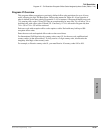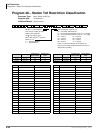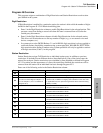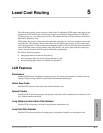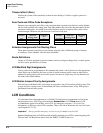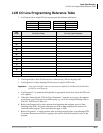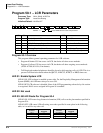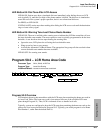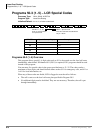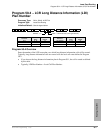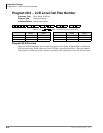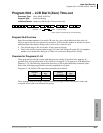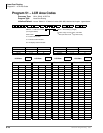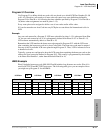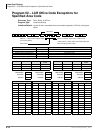
Least Cost Routing
Program 50-2 – LCR Home Area Code
Strata DK Programming 5/99 5-5
Least Cost Routing
LED Button 04: Dial Tone After LCR Access
LED 04 ON: Station users hear a simulated dial tone immediately after dialing the access LCR
code (typically 9), until the first digit of the phone number is dialed. The dial tone is simulated to
assure the user of the system’s proper operation, but it is not a functional dial tone.
For HMIS, set LED 04 ON.
If LED 04 is OFF, station users hear nothing after dialing the LCR access code until the destination
rings or issues a busy signal.
LED Button 05: Warning Tone Last Choice Route Number
LED 05 ON: The user is notified with a warning tone to indicate that LCR has routed the call over
the least desirable route number. The most expensive route is typically programmed to be the least
desirable. A user has three choices upon hearing the warning tone:
♦ Ignore the tone, LCR places the call using the least desirable route.
♦ Hang up and try later to save money.
♦ Activate the Automatic Call Back feature. The appropriate line group calls the user back when
a more desirable route number becomes available.
LED 05 OFF: No warning tone sounds.
Program 50-2 – LCR Home Area Code
Processor Type:
DK14, DK40i, All RCTUs
Program Type:
Least Cost Routing
Initialized Default:
Leaves the home area code blank
Program 50-2 Overview
LCR matches the area code entered here with the LCR route plan containing the home area code in
its Area Code Table. (The home area code is later entered into one of the available LCR route
plans through Program 51). Thus, LCR is informed of how to handle local calls.
Typically, systems are configured to have the LCR route plan containing the home area code as the
same as the local route plan defined in Program 50-5. Typically you would program it to be Route
Plan Number 1, rather than the default Plan 16.
DATA = Home (local) area CodeSELECT = 2



